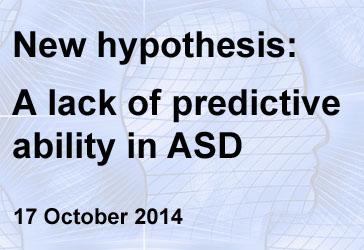Check out other stories from the Latest News
New Hypothesis of ASD as a Disorder of Prediction
By Chelsea E. Toledo, M.A. on October 17, 2014

Background: Autism spectrum disorder (ASD) is characterized by difficulties with social communication and tendencies to engage in restrictive, repetitive behaviors. While those traits have been widely recognized, research has yet to determine whether they share a common, underlying cause.
What’s New: On October 6, the Proceedings of the National Academy of Sciences published a study describing a new hypothesis: that ASD symptoms stem from an inability to predict what’s coming next. The researchers suggested that people with the disorder experience events “as if by magic”—with the cognitive systems for linking one happening in their environment to another somehow compromised. While their hypothesis doesn’t explain every aspect of the autism profile, the researchers asserted their belief that predictive impairment underlay two of the most salient and seemingly disparate traits: difficulties with social communication and tendencies to engage in restrictive, repetitive behaviors. For example, the same predictive impairment that inspires an individual to line up objects for comfort could also be at play when that individual experiences difficulty understanding intention of others. Finally, a reduction in motor anticipation could lead to atypical gesture and posture often observed in ASD children.
Why it’s important: This study provides a theoretical framework to explain various features of ASD. With this approach, researchers might be able to identify structures in the brain with differences ascribed to impaired predictive abilities.
Help me understand :
| Source(s) : |
| Tweet |

